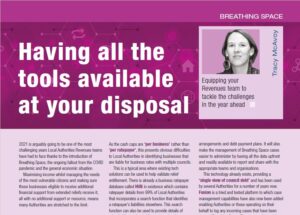 First Published in IRRV Insight May 2021 edition
First Published in IRRV Insight May 2021 edition
2021 is arguably going to be one of the most challenging years Local Authorities Revenues teams have had to face thanks to the introduction of Breathing Space, the ongoing fallout from the COVID pandemic and the general economic situation.
Maximising income whilst managing the needs of the most vulnerable citizens and making sure those businesses eligible to receive additional financial support from extended reliefs receive it, all with no additional support or resource, means many Authorities are stretched to the limit.
Working smarter and optimising performance
There are however ways to work smarter and leverage tech solutions to help automate some of the additional administrative processes these new challenges have brought and relieve some of the stress placed on staff. Not every technology investment requires a massive input from your internal IT team or a huge amount of money to get it up and running. Rather than distracting from handling your teams day-to-day duties of administering support and financial aid to citizens and businesses, applications of the right tools can help with automating, sifting through data, helping you reach better decisions and outcomes more quickly.
Expanded Retail Discounts
Take the budget announcement for example, announcing that expanded retail discounts would continue to apply in 2021-22, although a lifeline to many businesses this brings its own challenges to Authorities from an administration perspective.
With discounts in England running at 100% from April to June and then reduced to 66% from July through to March (2022) and cash caps applying for the remaining nine months, Authorities need to be able to verify eligibility. This has been further complicated by the fact that the cash caps apply at a Group Company level, meaning that holding companies and subsidiaries cannot claim up to the cash cap for each company, with the caps being applied at the Group level.
As the cash caps are ‘per business’ rather than ‘per ratepayer’, this presents obvious difficulties to Local Authorities in identifying businesses that are liable for business rates with multiple councils.
This is a typical area where existing tech solutions can be used to help validate relief entitlement. There is already a business ratepayer database called HUB in existence which contains ratepayer details from 99% of Local Authorities that incorporates a search function that identifies a ratepayers liabilities elsewhere. This search function can also be used to provide details of other holding and subsidiary companies that are part of the same company Group. An Authority can effectively see when a ratepayer is part of wider company Group structure and where the cash cap applies to the Group as a whole, rather than to the individual company. Quite quickly and simply an Authority can validate and verify whether a business is entitled to the 66% expanded retail discount prior to the Authority awarding the discount.
Managing your Breathing Space Cases
The introduction of the Breathing Space (debt respite) scheme on May 4th is another area which again provides a lifeline to many but significantly adds to the workload, challenges and demands placed on Revenues teams.
Local Authorities have a number of obligations under the scheme such as ensuring that any enforcement action taken by appointed agents against citizens in the scheme is stopped and being able to identify the total level of debt that citizen owes and which a moratorium has been applied to. This is in addition to notifying the debt adviser of any additional debts that are identified.
Ideally a Council should be able to view an individual’s entire debt across all departments within the Authority including Council Tax, Housing Benefits Overpayments, Parking Services, Rent Arrears and any Sundry Debt. The key to this will be sharing more data internally so that staff are aware of a customer’s total indebtedness across the council, and take this into account when agreeing arrangements and debt payment plans. It will also make the management of Breathing Space cases easier to administer by having all the data upfront and readily available to report and share with the appropriate teams and organisations.
This technology already exists, providing a ‘single view of council debt’ and has been used by several Authorities for a number of years now. Fusion, is a tried and tested platform to which case management capabilities have also now been added enabling Authorities or those operating on their behalf to log any incoming cases that have been granted Breathing Space. The system also enables Authorities to pass any relevant case details on to the associated debt department and to keep a track of where those cases are in the process.
With full reporting capabilities and the option to integrate consumer insights to provide a more rounded view of the finances of debtors, such as credit statements and the level of debt held by individuals, Fusion can be used to either manage cases entering Breathing Space or proactively try to identify and intervene on cases before they reach that stage.
Conclusion
These are just a couple of examples where technology can be used to consolidate data and automate some of the processes and decision-making required around these new areas. With staff being increasingly asked to step up and do more to support people in these extraordinary times, alongside their existing activities, don’t they deserve to have all the tools available at their disposal to get the job done efficiently and professionally whilst minimising the pressure placed on them?
If you want to find out more about the technologies discussed in this article please contact philip.ryan@destin.co.uk or duncan.baxter@destin.co.uk for more details.
